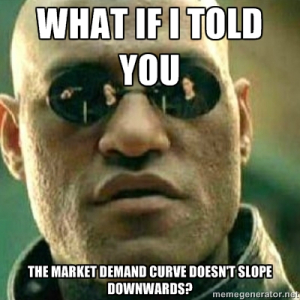From Lars Syll I think that modern neoclassical economics is in fine shape as long as it is understood as the ideological and substantive legitimating doctrine of the political theory of possessive individualism. As long as we have relatively-self-interested liberal individuals who have relatively-strong beliefs that things are theirs, the competitive market in equilibrium is an absolutely wonderful mechanism for achieving truly extraordinary degree of societal coordination and productivity. We need to understand that. We need to value that. And that is what neoclassical economics does, and does well. Of course, there are all the caveats to Arrow-Debreu-Mackenzie:
Topics:
Lars Pålsson Syll considers the following as important: Uncategorized
This could be interesting, too:
tom writes The Ukraine war and Europe’s deepening march of folly
Stavros Mavroudeas writes CfP of Marxist Macroeconomic Modelling workgroup – 18th WAPE Forum, Istanbul August 6-8, 2025
Lars Pålsson Syll writes The pretence-of-knowledge syndrome
Dean Baker writes Crypto and Donald Trump’s strategic baseball card reserve
from Lars Syll
I think that modern neoclassical economics is in fine shape as long as it is understood as the ideological and substantive legitimating doctrine of the political theory of possessive individualism. As long as we have relatively-self-interested liberal individuals who have relatively-strong beliefs that things are theirs, the competitive market in equilibrium is an absolutely wonderful mechanism for achieving truly extraordinary degree of societal coordination and productivity. We need to understand that. We need to value that. And that is what neoclassical economics does, and does well.
Of course, there are all the caveats to Arrow-Debreu-Mackenzie:
1 The market must be in equilibrium.
2 The market must be competitive.
3 The goods traded must be excludable.
4 The goods traded must be non-rival.
5 The quality of goods traded and of effort delivered must be known, or at least bonded, for adverse selection and moral hazard are poison.
6 Externalities must be corrected by successful Pigovian taxes or successful Coaseian carving of property rights at the joints.
7 People must be able to accurately calculate their own interests.
8 People must not be sadistic–the market does not work well if participating agents are either the envious or the spiteful.
9 The distribution of wealth must correspond to the societal consensus of need and desert.
10 The structure of debt and credit must be sound, or if it is not sound we need a central bank or a social-credit agency to make it sound and so make Say’s Law true in practice even though we have no reason to believe Say’s Law is true in theory.
An impressive list of caveats indeed. Not very much value left of “modern neoclassical economics” if you ask me …
 Still — almost a century and a half after Léon Walras founded neoclassical general equilibrium theory — “modern neoclassical economics” hasn’t been able to show that markets move economies to equilibria.
Still — almost a century and a half after Léon Walras founded neoclassical general equilibrium theory — “modern neoclassical economics” hasn’t been able to show that markets move economies to equilibria.
We do know that — under very restrictive assumptions — equilibria do exist, are unique and are Pareto-efficient. One however has to ask oneself — what good does that do?
As long as we cannot show, except under exceedingly special assumptions, that there are convincing reasons to suppose there are forces which lead economies to equilibria — the value of general equilibrium theory is negligible. As long as we cannot really demonstrate that there are forces operating — under reasonable, relevant and at least mildly realistic conditions — at moving markets to equilibria, there cannot really be any sustainable reason for anyone to pay any interest or attention to this theory.
A stability that can only be proved by assuming “Santa Claus” conditions is of no avail. Most people do not believe in Santa Claus anymore. And for good reasons. Santa Claus is for kids, and general equilibrium economists ought to grow up.
Continuing to model a world full of agents behaving as economists — “often wrong, but never uncertain” — and still not being able to show that the system under reasonable assumptions converges to equilibrium (or simply assume the problem away) is a gross misallocation of intellectual resources and time.
And then, of course, there is Sonnenschein-Mantel-Debreu!
So what? Why should we care about Sonnenschein-Mantel-Debreu?
Because Sonnenschein-Mantel-Debreu ultimately explains why ‘modern neoclassical economics’ — New Classical, Real Business Cycles, Dynamic Stochastic General Equilibrium (DSGE) and ‘New Keynesian’ — with its microfounded macromodels are such bad substitutes for real macroeconomic analysis!
These models try to describe and analyze complex and heterogeneous real economies with a single rational-expectations-robot-imitation-representative-agent. That is, with something that has absolutely nothing to do with reality. And — worse still — something that is not even amenable to the kind of general equilibrium analysis that they are thought to give a foundation for, since Hugo Sonnenschein (1972) , Rolf Mantel (1976) and Gerard Debreu (1974) unequivocally showed that there did not exist any condition by which assumptions on individuals would guarantee neither stability nor uniqueness of the equlibrium solution.
Opting for cloned representative agents that are all identical is of course not a real solutionto the fallacy of composition that the Sonnenschein-Mantel-Debreu theorem points to. Representative agent models are — as I have argued at length here — rather an evasionwhereby issues of distribution, coordination, heterogeneity — everything that really defines macroeconomics — are swept under the rug.
Instead of real maturity, we see that general equilibrium theory possesses only pseudo-maturity.
For the description of the economic system, mathematical economics has succeeded in constructing a formalized theoretical structure, thus giving an impression of maturity, but one of the main criteria of maturity, namely, verification, has hardly been satisfied. In comparison to the amount of work devoted to the construction of the abstract theory, the amount of effort which has been applied, up to now, in checking the assumptions and statements seems inconsequential.
